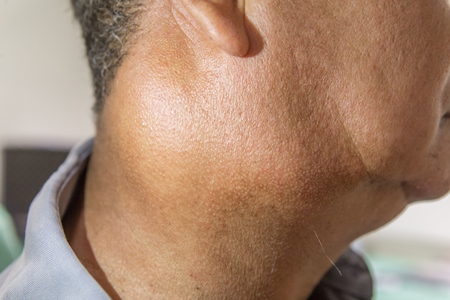
With the new Covid variant, certain symptoms such as cough and sore throat, seem more frequent, whereas fewer people report loss of smell or taste. Could all ENT symptoms be a sign of Covid-19? Mr Parag Patel, ENT Surgeon at New Victoria Hospital, explains some of the most probable causes for common ENT symptoms and when you should seek medical advice.
ENT symptoms and Covid-19
Last year, the only officially recognised symptoms of Coronavirus were fever, dry cough and shortness of breath. The list was soon expanded to include the loss of smell and taste, fatigue, headache and gastrointestinal symptoms, among others.
Why do you lose the sense of smell and taste with Coronavirus?
Anosmia and ageusia, the loss of sense of smell and taste, are common to other Sars viruses but are considered frequent symptoms for Sars-CoV-2.
A study on the American Journal of Otolaryngology showed that among 172 Covid patients, the loss of taste and smell was a symptom in about 50% of them, often accompanied by other common Coronavirus symptoms.
Only 4.54% of patients reported the loss of sense of smell, and 1.23% the loss of sense of taste, as the only symptom.
Recent findings from Harvard Medical School research show that the loss of smell seems to be caused by the infection of “support cells”. These cells support the olfactory receptors and they are not the receptors themselves. However, the underlying mechanism is still unclear.
What are the consequences in the long term?
In most patients, the sense of smell and taste recovers in a few weeks. The Harvard study would explain the quick recovery with neuron cells remaining undamaged during the infection.
Very few patients might still experience anosmia and ageusia after months from symptom onset.
Olfactory and gustatory functions can be retrained and reacquired with time. However, if your sense of smell or taste doesn’t come back in a few weeks after recovery from Covid-19, you should speak to your GP or see an ENT specialist.
Is earache always a sign of Covid-19?
Ear infections are very common, especially during wintertime.
Although there are studies that found the presence of Coronavirus in the ear, there is no evidence that it can cause pain or any other symptoms.
However, inflammation of your sinus, throat and eustachian tubes, the pipe that connects the middle ear, the back of the throat, and the nasal cavities can cause symptoms such as pain or discomfort in your ear.
Although further studies are necessary, having earache is unlikely a sign of Covid-19, especially if no other symptoms are present.
Earache can also depend on excessive earwax or a change in pressure.
Cough and sore throat
Cough and sore throat are indicated as a sign of Covid-19 with cough being usually more frequent. Recently, an ONS analysis found out that cough and sore throat can be more frequent symptoms of the new virus variant.
But having a cough and/or sore throat doesn’t necessarily mean that you have Covid.
They can be symptoms of flu. Sore throat, if associated with difficulty in swallowing, can be a sign of tonsillitis. There could be many other different causes.
If you have these symptoms, you should seek advice from your GP, and the only certain way to exclude Coronavirus is to have a swab test.
If your test is negative, but your symptoms persist, you can book an appointment with an ENT consultant, for specialist care.
Tinnitus
A recent study, involving over 3.000 patients suffering from tinnitus, aimed at investigating if there was any correlation with Covid-19 symptoms and prevention measures, such as social distancing and isolation, and the severity of tinnitus.
Of the 237 patients reporting Covid-19 symptoms, 54% said their tinnitus was stable, it improved for 6% and got significantly worse for 40% of them.
The improvement was explained by the greater patient attention on Coronavirus symptoms, whereas the perceived exacerbation of tinnitus was linked to increased worry, anxiety and stress coming from contracting the virus.
There is no direct correlation between Covid-19 and tinnitus. However, the pandemic’s impact on mental health seems to be a trigger for more acute tinnitus symptoms in some patients.
If you experience any ENT symptoms, the general advice is to verify whether other common Covid-19 symptoms are present. In this case, you should stay at home and get a swab test. If symptoms get worse, speak to your GP.
For specialist advice, you can also speak to one of our ENT Consultants by calling our Outpatient Department on 020 8949 9020 to book an in-person or virtual consultation.













